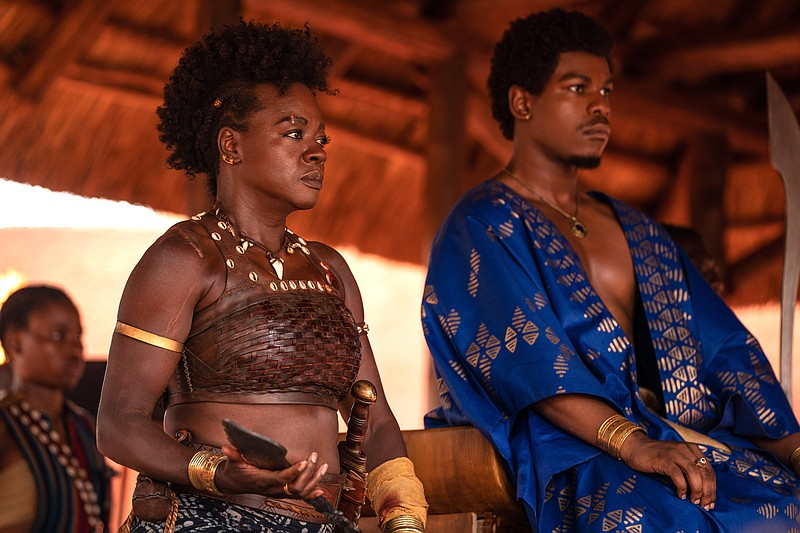Just like I can't do massive crowds well, I can't do controversy well. Or at least, I can't do controversy like all these folks on social media expect me to do.
It was on social media that I found out about the brouhaha over the movie "The Woman King," the film about the all-female African Army, and then found out — too late — I was "supposed" to boycott it. Why the boycott? "Because of what they perceive as whitewashing the history of the subjects depicted," according to a TMZ.com article. "The criticism ... the African tribe shown on screen [in the 19th-century kingdom of] Dahomey, as well as their all-female military regiment, the Agojie, are presented as righteous, empowering liberators in all the marketing thus far ... when in reality, they were knee-deep in the Atlantic slave trade. ...
"While some have made it clear they're against glorifying anyone who facilitated the slave trade, white or Black, and appear dead set on boycotting ... ," the article continues, "others are arguing people should see the film for themselves, saying it does in fact tackle the issue with nuance."
I went to see the movie and, hey, had a heck of an adrenaline rush. Didn't consider myself to be fooled or lulled by any revisionist history.
But we live in a world where, according especially to social media, we're fools and wimps if we're not outraged by something.
A social media search revealed a small gaggle of other boycotts: boycott "The Little Mermaid" (the new, live-action version with the non-white Ariel). "Boycott Bollywood," "Boycott Qatar 2022" (the site of the 2022 World Cup, over the country's treatment of those who built the stadium, among other maltreatment recipients). The call to boycott gas over the Fourth of July weekend this summer. Calls to boycott the 2022 Olympics, held in China in February.
There was a call, of sorts, to boycott any respect being paid to Queen Elizabeth of Great Britain when she passed on Sept. 8; controversy arose about the British imperialism she represented, and its historical dark side — from slavery to exploitation and the theft of wealth from British colonies. "We do not mourn the death of Elizabeth, because to us her death is a reminder of a very tragic period in this country and Africa's history," the Economic Freedom Fighters, a South African political party, is quoted in a statement in a Yahoo.com piece.
"If boycotts are a form of legitimate protest, then social media users seem to have taken that to another level these days," states a synopsis of "Brands and public personalities 'walk on eggshells' as social media boycotts trend" — an economictimes.indiatimes.com story I couldn't read (because I would have had to pay to subscribe, which I consider fair enough, for obvious reasons). "Anything and anyone can be the target of the global cancel culture, and brands and celebs seem to be at the receiving end of it."
It's enough to make you come to the conclusion that whatever you do, whatever you go for, there's going to be somebody around telling you that you shouldn't do it/go for it, and if you do, you should be considered naive/a worthless slug/someone who's complicit in exploitation/a flaming, slithering liberal/a right-wing Nazi if you do. (Oh, by the way, there's a "Boycott Amazon" movement, too, and as you've read here before, I'm neck-deep in Amazon customerhood.)
Thing is, at some point, you gotta live. And to keep your peace and your sanity — because being outraged about something all the time is going to wreak havoc on your health — you've got to pick your battles. Yes, you certainly should stand up against life's injustices as best you can. No, you don't want to be complicit in perpetuating any rose-colored-glasses beliefs about serious issues whose truths should come to light, thereby helping people to make informed decisions on these issues.
But the fact is that avoiding or boycotting everything that has a checkered background or is perceived by some as having one is pert-near impossible. Each of us certainly has to decide how prepared we are to believe those who tell us we should stand for or against an issue, rather than investigating that issue ourselves. Each of us has to then decide how far down the rabbit hole we want to go in standing for, or against, that issue; and how prepared we are to avoid everything else that might run afoul of our beliefs and sensibilities in the same way as the thing we've chosen to "boycott." (Per the "Little Mermaid" boycott, I'm with those who've made the point about all the white actors' portrayals of nonwhites in earlier movies.)
Do I get upset at the thought of injustice, hate, mistreatment and exploitation of vulnerable individuals? Sure. Does it bother me that the very things I choose to eat/wear/use/enjoy as a consumer may have been made with exploited labor? Of course. Do I wish we'd all be willing to learn the truth about the less noble aspects of our history and learn from them so that we won't repeat them? Oh, yeah.
But I know the limits to my capacity for fiery activism and crusaderism. And I realize that doing what little I can to make the world a better/more educated/more informed/more humane place can involve other things beside boycotts ... or calling for them on Facebook, Twitter or Instagram.
Email: hwilliams@adgnewsroom.com
